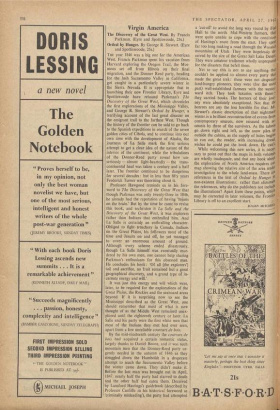Virgin America
The Discovery of the Great West. By Francis Parkman. (Eyre and Spottiswoode, 25s.) Ordeal by Hunger. By George R. Stewart. (Eyre
and Spottiswoode, 25s.)
THE year 1846 was a big one for the American West. Francis Parkman spent his vacation from Harvard exploring the Oregon Trail, the Mor- mons set off from Illinois on their final migration, and the Donner Reed party, heading for the lush Sacramento Valley in California, got caught in a particularly severe winter in the Sierra Nevada. It is appropriate that in launching their new Frontier Library, Eyre and Spottiswoode have reissued Parkman's The Discovery of the Great West, which chronicles the first explorations of the Mississippi Valley, and George R. Stewart's Ordeal by Hunger, a terrifying account of the last great disaster on the emigrant trail to the farthest West. Though the history of the frontier can be said to go back to the Spanish expeditions in search of the seven golden cities of Cibola, and to continue into our own time with the development of Alaska, the journeys of La Salle mark the first serious attempt to get a clear idea of the nature of the interior of the continent; while the tribulations of the Donner-Reed party reveal how un- seriously — almost light-heartedly — the trans- continental haul was taken a century and a half later. The frontier continued to be dangerous for several decades: but in less than fifty years Frederick Turner was theorising about it.
Professor Hawgood reminds us in his fore- word to The Discovery of the Great West that though Parkman was only twenty-three in 1846, he already had the reputation of having 'lnjuns on the brain.' But by the time he came to revise this book, and rechristen it La Salle and the Discovery of the Great West, it was explorers rather than Indians that enthralled him. And La Salle is certainly an enthralling character. Obliged to fight- treachery in Canada, Indians on the Great Plains, his followers most of the time and Jesuits on and off, he yet managed to cover an enormous amount of ground. Although every scheme ended disastrously, though La Salle himself was eventually mur- dered by his own men, one cannot help sharing Parkman's enthusiasm for this obsessed man. He concludes his book: 'Of all [the explorers'] toil and sacrifice, no fruit remained but a great geographical discovery, and a grand type of in- carnate energy and will.'
It was just this energy and will which were, later, to be required for the explorations of the Great Plains, the Rockies and the seaboard areas beyond. If it is surprising now to see the Mississippi described as the Great West, one should remember that most of what is now thought of as the Middle West remained unex- plored until the eighteenth century or later. La Salle and his party were the first white men that most of the Indians they met had ever seen, apart from a few unreliable coureurs de bois. By the mid-nineteenth century the coureurs de bois had acquired a certain romantic status, largely thanks to Daniel Boone, and it was such mountain men that the Donner-Reed party ur- gently needed in the autumn of 1846 as they struggled down the Humboldt in a desperate attempt to reach the Sacramento Valley before the winter came down. They didn't make it. Before the last man was brought out in April, 1847, nearly half the party had starved to death and the other half had eaten them. Deceived by Lansford Hastings's guidebook (described by Professor Cunliffe in his historical foreword as 'criminally misleading'), the party had attempted a 'cut-off' to avoid the long way round by Fort Hall to the north. Mid-Western farmers, they were quite unable to cope with the conditions of Hastings's route from the start. They spent far too long making a road through the Wasatch mountains of Utah. They were hopelessly de ceived by the size of the Great Salt Lake Desert. They were amateur trailsmen wholly unprepared for the disasters that befell them.
Yet to say this is not to say anything that couldn't be applied to almost every party that made the great trek: these were not desperate land-hungry pioneers, they were (for the most part) well-established farmers with the wester' ward itch. They took luxuries with them-- they carried books. The horrors of their jour• ney were absolutely exceptional. Not that the horrors are any the less horrible for that. Mr• Stewart's classic description of that nightmare winter is a brilliant reconstruction of events from contemporary sources, now reissued with ac• counts by three of the survivors. As the taboos go down right and left, as the snow piles a outside the cabins, as the supply of hides begins to run out, the reader, with increasing dread, wishes he could put the book down. He can While welcoming this new series, it is neces- sary to point out that the maps in both volumes are wholly inadequate, and that any book abort the exploration of North America requires one map showing the relative size of the area under investigation to the whole land-mass. There are references in the text of Ordeal by Hunger to non-existent illustrations: rather than eliminate the references, why do the publishers not include the illustrations? Apart from these points, which may be corrected in later volumes, the Frontier Library is off to an excellent start. JULIAN MITCHELL'














































 Previous page
Previous page